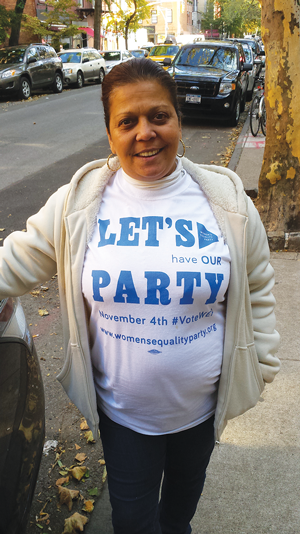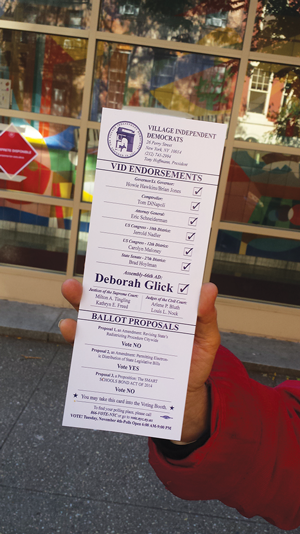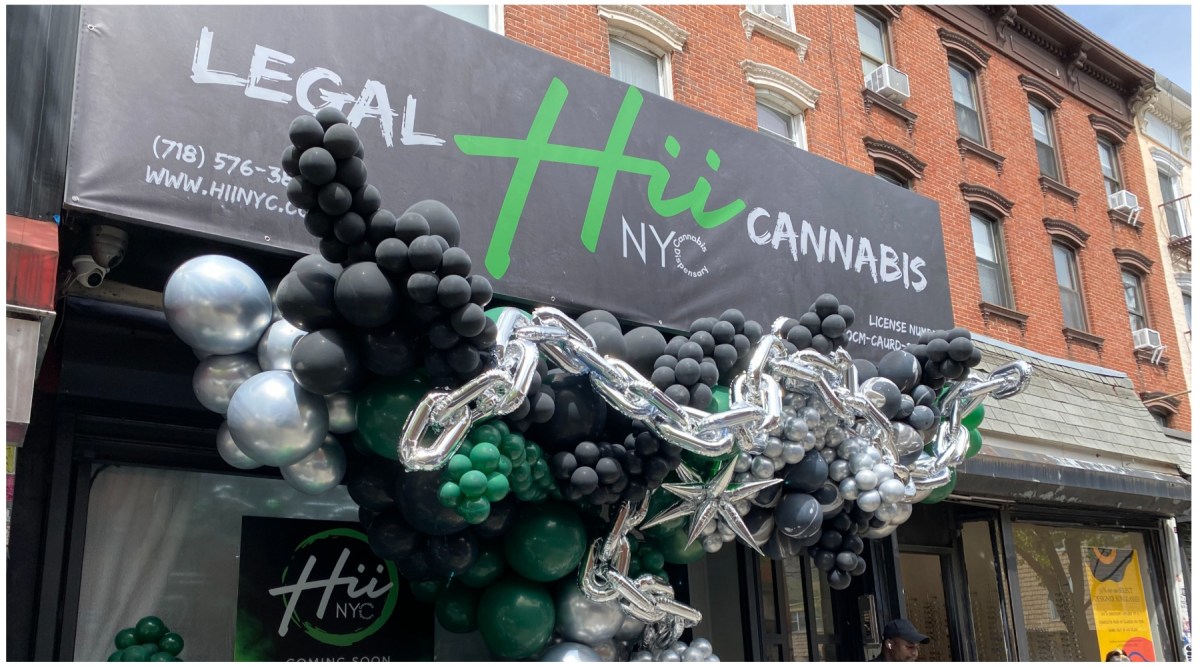
BY LINCOLN ANDERSON | Unfortunately for them, it wasn’t a “Teachout-able” moment for Howie Hawkins and Alexander Meadows on Tuesday, as the long-shot candidates failed to replicate Zephyr Teachout-like results in their third-party challenges to incumbents Andrew Cuomo and Deborah Glick. In fact — not surprisingly — they both lost badly.
To use a football analogy…well, it was like Glick was the Super Bowl Seahawks and Meadows was a junior varsity team.
Glick, the 24-year Democratic representative for the 66th Assembly District, coasted to re-election with 79.7 percent of the vote. Meadows, who entered the field late and ran on his own Progressive Party line, only netted 7.4 percent of the vote. He was even beaten by the Republican candidate, Nekeshia Woods, who garnered 12.8 percent of ballots cast.
Breaking it down into the raw numbers, Glick captured 16,141 votes, to Woods’s 2,598 and Meadows’s 1,503.
The 66th District includes the West Village, Hudson Square, Tribeca, Soho, Noho, the East Village west of First Ave. and a small part of Union Square.
Meadows had sought to capitalize on concern over the Hudson River Park development-rights transfer legislation that was stealthily passed at the end of the legislative term last year, as well as the Albany leadership’s cover-up of sexual-abuse incidents, but his late-start campaign never caught fire.
Hawkins, the Green Party candidate for governor, ran on a Green New Deal, opposing hydrofracking and saying New York State could be fully powered by sustainable energy by 2030. However, in the end, Hawkins only captured 4.9 percent of the vote, while Cuomo got 54 percent and G.O.P. challenger Rob Astorino got 40.6 percent.
At a rally the previous Monday in front of the Stonewall Inn, on Christopher St., Hawkins and Meadows had cross-endorsed each other. Hawkins warned that Cuomo couldn’t be trusted to protect New York’s drinking water.
“Cuomo, if he was going to ban fracking, he would have done it by now,” Hawkins declared. “Now this study will be done before the end of the year — but after the election.
“That health impact analysis we’ve all been waiting for for years, will suddenly become available after the election.”
Hawkins was referring to a health study on fracking that the Cuomo administration has been conducting for the past two years.
As for what the governor might decide on fracking, Hawkins said, the administration “leaked a trial balloon two years ago,” in which fracking wouldn’t be allowed in the New York City or Syracuse watersheds, while elsewhere “home rule” would prevail on whether fracking would be permitted.
Meanwhile, as the days before the election wound down, Glick continued to duck Meadows’s call to debate.
“I’m shocked that Deborah is unwilling to have a debate,” said Tom Connor, a Meadows and Hawkins supporter, at the Stonewall event. “We’ve been saying that there’s low voter turnout — and then she won’t do this. I know what she’s doing, but she’s supposed to be an open progressive.”

Connor is a member of Village Independent Democrats, which is both Glick and Meadow’s political club. By “knowing what she’s doing,” Connor meant that, as a strong frontrunner, it made sense for Glick simply to ignore Meadows’s challenge to debate.
For his part, Meadows said, if elected, he would bring a fresh outlook to the Assembly seat.
“We know that the system is rigged,” he said. “Howie and I are looking beyond the old guard. We’re looking 10 to 15 years down the road. Our progressive values are aligned with the voters of the district and not the flawed values of the leadership in Albany.”
Regarding why she didn’t accede to a debate with Meadows, Glick previously told The Villager, for starters, that she was “booked-up” the last couple of weeks. However, she also charged that Meadows was “flouting campaign finance law” because he had not made the required filings of his campaign contributions and expenses. In fact, she said, she didn’t even know whether to consider him “a real candidate.”
One month ago, Meadows — in an article in The Villager announcing his campaign — claimed he had $30,000 on hand for his campaign. Yet, he had failed to post a required 32-day pre-election filing demonstrating that he actually had these funds.
About a week ago, he finally did post the required filings, making them publicly viewable on the state Board of Elections Web site. His 32-day report noted $14,752 in campaign contributions and $10,678 in expenditures, with a closing balance of $4,073. Most of his funds for this period were from Darren Parslow, of W. 21st St., who gave $10,000 in July, and from Mark Lee, of W. 24th St., who gave $4,100 in September.
Meadows’s 11-day pre-election filing shows an additional $1,650 in contributions — including $500 from Richard Stewart, the Village-area Republican district leader and, like Meadows, a member of Community Board 2 — with a closing balance of about $3,700.
Asked at the Stonewall rally about his claim of having $30,000 in campaign funds on hand in early October, Meadows said commitments had been made to him and “doors were opened,” but that some of those doors later closed.
Admittedly, he is a political newcomer, this being the first election he actually competed in to the end, having dropped out of last year’s City Council District 3 race. According to a source, the reason Meadows’s filings weren’t posted on time was because he filed them wrong, and had to resubmit them.
Meanwhile, Glick’s 32-day pre-election filing reported about $84,000 in cash in her war chest, while her 11-day summary showed about $74,500 of that remaining.
A month ago, V.I.D., which had snubbed Cuomo to endorse Teachout in the Democratic primary, crossed party lines to endorse Hawkins in the general election. Last week, Downtown Independent Democrats followed suit, backing the Green gubernatorial candidate.
“Hawkins is the only candidate that has consistently called for a ban on hydrofracking,” a D.I.D. press release said. “Hawkins’s stances on the minimum wage, public education, single-payer healthcare, municipal taxes, clean energy and public transportation make him the only candidate New York progressives can support.”
Yet, a few days before the election, one Downtown political club member who had initially supported Hawkins, said she was “in quandary” over it. Requesting anonymity, she said she was upset that Hawkins had thrown his support behind Meadows over Glick, and also that Hawkins advocates that the U.S. divest its financial support of Israel.
Asked for Hawkins’s position on the B.D.S. (Boycott, Divest and Sanctions) movement against Israel, a Hawkins spokesperson sent the following statement from the candidate, which read, in part:
“I support gradually escalating sanctions, including boycotts and divestment, until Israel stops expanding the settlements on the West Bank, ends the blockade of Gaza, and starts honestly negotiating a settlement in accord with international law, a two-state solution based on the pre-1967 borders. … The U.S., and New York State with respect to its pension investments, must begin taking substantive action like sanctions, so that the Israelis know that they do not have our support for annexing Palestine and oppressing Palestinians.”
Meanwhile, at P.S. 41, at W. 11th St. and Sixth Ave., on Tuesday, voters in exit and entrance polls offered their take on the candidates and explained why they voted how they did.
Christopher Vinger, a college administrator at New York School of Interior Design, said he voted for Glick, Congressmember Jerry Nadler and Cuomo, too.
“He’s a little bit of a crook, but he’s our crook,” he said of Cuomo. “I don’t know what to make of the corruption things,” he said of the governor’s abruptly shutting down his Moreland Commission when it started to probe his own campaign finances too closely.
How about Meadows?
“Hadn’t even heard of him,” he admitted.
Vinger said he was “a little bit concerned about how compromised Cuomo would be” on fracking, due to the vast amounts of money involved, but that there’s a lot more water here than in his native Texas, so it’s not as big a threat.
Archer Irby was in a hurry and rushing in to vote, but paused outside the door to confess he didn’t feel he was that informed for this election, and planned to vote “straight Democratic.” Yet, in his brief statement, he offered a pretty cogent take on things.
“At high levels of government,” he said, “the candidates are so often a mixture of good and bad, that often we must compromise on our principles — and hope we don’t dispense with them altogether.”
Meanwhile, Jim Fouratt, another V.I.D. member, was miffed over the club’s “palm card.” The card featured a list of the club’s preferred candidates, in descending order of political office. Deborah Glick’s name was listed at the bottom, but in big, bold letters, while Green candidate Howie Hawkins’s name was at the top, but in the same small type as everyone else’s name except Glick’s.
“There was no resolution by the club to do this,” Fouratt fumed.
A Meadows supporter, he said the candidate had expected to get more contributions from wealthy gays. But the veteran activist accused one local politician of telling people not to give to Meadows. According to Fouratt, in his nonpolitical life, Meadows is the “personal assistant to the two guys who run Barney’s.”
One man exiting the poll site, a Village-area psychotherapist who requested anonymity due to his profession, said, “I voted all Democratic, but I voted for Meadows.”
“I feel like Glick is a little bit too entrenched,” he said. “I want to see change, somebody…with new ideas. I was a bit ambivalent about it because Glick has been good for Downtown and well-meaning. But I think we need new blood. She’s had a long run. The [park] air-rights issue was an issue for me, actually, and the sensitivity to sexual-abuse issues in Albany.”
“I hate them all,” muttered a jewelry designer who only gave her first name, Elaine, as she left P.S. 41. She was munching on a $1 brownie she had bought inside to help support the school. “I don’t trust anybody…except Jerry Nadler. Cuomo, he’s never come out against fracking, but I don’t want a Republican to win. So my sister said I should vote for the other guy,” she said.
Hawkins?
“Yeah!”
Her sister also said not to vote for Glick, she added.
“I don’t know why…so, I voted for the other guy.”
Meadows?
“Yeah!”
She bemoaned N.Y.U.’s “tearing down the Village” and the loss of St. Vincent’s Hospital.
“There are just so many problems,” the woman said. “And the real estate people always win. The Chelsea Market, they put that f—— thing on top.”
One young man, sporting dark sunglasses and a bushy black beard, said, “I don’t like Deborah Glick, but I like Brad Hoylman. I don’t like Kathy Hochul [for lieutenant governor] on the ballot with Cuomo. I like Jerry Nadler.”
Asked why he doesn’t like Glick, he said it’s because he supports the N.Y.U. mega-development plan on the South Village superblocks. Glick is the lead plaintiff in a community lawsuit against the project.
“I voted for her. I didn’t like the alternatives,” he said. “It makes sense in terms of the long-term health of the area,” he said of the “N.Y.U. 2031” project. “The superblocks are ugly.”
A husband and wife — 30-year Village residents, both teachers — said they voted Working Families Party all the way.
“I like Cuomo,” the man said, “but I wanted to send a message that he needs to be more progressive.”
What about Meadows — whose name was all the way at the right?
“I didn’t even see Meadows,” the man said.
Jared Cohen, a records retainer, similarly said he voted “Working Families Party down the line,” plus for Hawkins.
“Fracking is a big issue, his delaying on it,” he said of Cuomo, “cutting a deal with the Working Families Party, then stabbing them in the back by putting up this grassroots pseudo-party, the Women’s Equality Party.”
A native Villager, he attended P.S. 41 as a kid. He said his father was radical attorney Stanley Q. Cohen — who defended Black Liberation Army member Assata Shakur, who was convicted for murder but escaped to Cuba. His mother was the manager at the old Waverly Inn.
Speaking of having roots, he said he voted for Kathryn Freed for State Supreme Court, but didn’t fill in the circles for any other judicial candidates since he knew nothing about the rest.
“I recognized her name,” Cohen said. “I’ve seen reportage on her. I never saw anything negative about her. I think she was a community board member and a city councilmember. So she paid her dues — and for that she deserves support.”

















